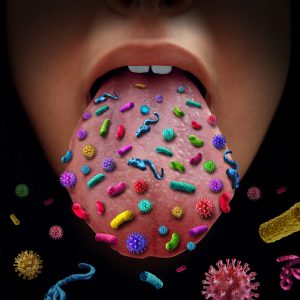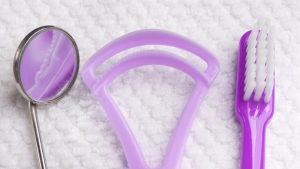Have You Had Your Annual Exam and Dental Cleaning?
December 28, 2018Advanced Technology for a Better Dental Visit
January 9, 2019Ever had halitosis? Odds are that you have. You simply may not know that this is the scientific term for bad breath. Patients can get bad breath for many reasons, but the most common one is bacteria on the tongue. The tongue is an area of the mouth that too many patients skip cleaning. However, it hosts the most bacteria in all of your mouth.
Got Bad Breath?
The scientific name for bad breath is halitosis, and you get it from the bacteria in your mouth. Even though you can’t see them, bacteria are all over your mouth, and they can be both good and bad for you. Your saliva keeps that bacteria at bay and will use the good bacteria to strengthen the teeth. You actually want to make sure you are drinking enough water to fully hydrate your body throughout the day. When you’re hydrated, your saliva flow is normal, and your teeth, gums and tongue are continually bathed in liquid. When you go to sleep at night, the amount of saliva you’re producing diminishes because you’re not eating, drinking, talking or moving your mouth.
That dryness makes it so bacteria starts to smell in your mouth, as the saliva isn’t removing the bacteria or covering up the smell. If you sleep with your mouth open, you can have even worse bad breath than someone that doesn’t. When you get halitosis when you’re not sleeping, look to what you just ate. If you’re getting it without food and it’s more than just morning breath, you probably have a ton of bacteria in your mouth causing the odor.
What’s Really In Your Mouth?
Studies have traced 700 different strains of bacteria to the human mouth. This is not something to panic about just yet, as most people only have up to 72 strains in their mouth. You most likely have less, especially if you take care of your oral health. However, a good base number for most people to have is at least 30-34 types of mouth bacteria. There is no way to fully get rid of the bacteria that live on your teeth, gums and tongue, and you wouldn’t want that. There are some bad bacterial strains that will lead to digestive problems and oral health diseases, but there are others that aid in your digestion and your oral health as well.
Is Mouth Bacteria Bad?
That depends. Mouth bacteria is needed in every mouth to start the process of digestion. As you chew your food, bacteria and acids in your saliva start to break down your food into smaller pieces. When it’s carried down your throat with swallowing, bacteria continually break up your food so the individual nutrients can be used for cells. That’s the type of bacteria you want to have.
A bacteria can be “bad” if it leads to erosion and breakdown of your teeth, gums and tongue. Tooth decay—or cavities—actually happens because of certain strains of mouth bacteria. That bacteria will mix with sugars when you eat to create a sticky film called plaque. That plaque will then stick to the teeth and acids in that substance will start to break up your tooth enamel minerals. Over time, if you don’t brush and floss your teeth, the minerals in your tooth enamel will break up and start to decay. Cavities then form and that part of your tooth dies. So yes, mouth bacteria can be bad for your oral health when oral hygiene recommendations are not followed.
Reducing Bacteria in Your Mouth
The best way to reduce your bad breath frequency is to keep your tongue and teeth clean. You do this through great oral hygiene habits that are quite easy to do. Brushing your teeth is one of those habits. Flossing is another. The American Dental Association recommends brushing your teeth at least twice a day to keep decay-causing bacteria off of the teeth and tongue. Always use ADA-approved toothpaste that is certified to be safe and that can help reduce your mouth bacteria.
Many people may brush the teeth, but they may forget to brush the tongue. Your tongue is even more important than brushing your teeth at times because it is the haven for mouth bacteria to thrive. All those different types of strains will reside on your tongue and soft tissue surfaces easier than they will the hard surfaces (like the teeth). You can even see food and other particles collecting on the tongue throughout the day when you eat. If you notice bad breath happening, see if you can detect a difference by brushing your tongue each day. Make sure to get the particles at the back of the tongue that cake on there. Removing all the gunk will remove lots of bacteria that give you bad breath. Over time, you may even notice that your bad breath goes away and is very faint in the morning.
We mentioned flossing, which is something you should do 1-2 times a day. Floss all the way up in the gum line and use new floss each time. Reusing floss from day-to-day introduces old bacteria into a mouth you’re trying to get clean. Scrape your teeth as you floss to remove buildup that is on your tooth enamel.
Healthy Tongue, Teeth and Gums
Having a healthier mouth is as simple as brushing and flossing your teeth. If you still have problems with bad breath, try adding in mouthwash to your oral health routine. Many aim to get rid of bacteria that cause you bad breath. Some come enhanced with fluoride, which is a mineral that will strengthen your teeth against bacteria. Want to have better oral health this year? Brush your teeth. Want to avoid bad breath? Pay extra special attention to your tongue. Don’t forget to schedule a dental visit as well, where you can have your oral health assessed. Simply call Family & Cosmetic Dentistry of the Rockies at (970) 267-0993!







